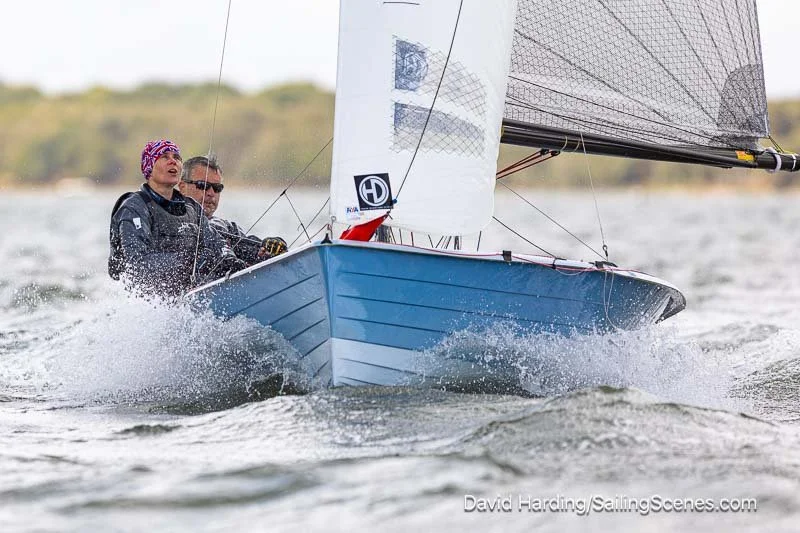Day 5
A Jolly Hard Way To Earn A Beer
As ways go to earn yourself a pint (the day’s sponsor was Hall & Woodhouse), racing on the Thursday of Poole Week in 2025 was probably among the harder ones.
The previous day, racing had been postponed by an hour to give the wind a chance to ease, which it did. No easing was in prospect on Thursday, so the fleets were sent out into Poole Harbour to make what they could of whatever they found
At just after 1pm, the wind on the Parkstone Platform had dropped from 20 knots gusting 30, down to 16 gusting 24. That’s manageable for most people. Then it picked up again: by the scheduled start time of 2pm, it was up to 24 gusting 30.
For some, that was more than enough. Several fleets simply didn’t go out, and numbers were down in those that did. Even beating across the harbour to the Top Triangle was hard work for those using the committee-boat start line. Only four Wayfarers set out, two with reefed mainsails, and one of those decided to return home rather than enter battle. While many people might think of Wayfarers as solid, stable and forgiving, they’re challenging boats to sail in a breeze. One very experienced sailor, who raced Fireballs and other high-performance classes before later joining the Wayfarers, commented recently that he found the Fireball easier and more forgiving to sail – and notably easier to gybe – in strong winds. ‘Because it’s so much faster downwind, everything becomes lighter and the apparent wind reduces. You also generate dynamic stability from your speed. A Wayfarer might be stable in some respects, but in fresh conditions it’s a physical and demanding boat to sail.’
That might explain why the Wayfarers’ spinnakers stayed in their bags or chutes, while the RS200s and 400s, Merlin Rockets and other lighter, faster classes were flying them freely.
Even the asymmetric classes had their moments downwind, however. When it’s gusting 30 knots (or possibly a little more), it can be a safer option to drop, gybe and re-hoist – as was done a time or two – than to risk putting the mast in the water. A few ‘granny tacks’ (wearing round, in traditional parlance) were seen as well.
The flying Melges 15 was undoubtedly the fastest boat downwind on Thursday, its only competition in the fast handicap fleet being David Evans's Contender, which appeared to have the advantage upwind. Sailing conservatively – insofar as one can in a trapezing single-hander in 30-plus knots – and staying upright, Evans won the only race of the day.
It was a day of only one race for everyone, including the four Merlin Rockets that put on a fine display of heavy-weather boat-handling. Steve and Ally Tyler managed to keep their nose ahead of Mike and Jane Calvert to eke out a one-point lead in the overall standings.
In the XODs, overall leaders John Tremlett, Tim Copsey and Fraser Graham in X91 shot ahead early on and stayed there. Willie McNeill improved on his 3rd place on Wednesday to finish 2nd
For Peter Loretto and Lily Tointon, a fourth straight win in the RS200s – in which they were the day’s only finisher – kept them comfortably at the top of the table.
The fleets starting from the Parkstone Platform were also notably depleted. Two Darts made it round, as did eight ILCA 6s – led home again by Rob Jackson – and seven ILCA 7s of the 26 entered. Parkstone’s Matt Reid put in one of his occasional appearances and disappeared over the horizon, Michael Atkinson finishing second.
Anybody who completed the course and scored a result on Thursday fought and won several battles along the way – and definitely earned a beer.
David Harding
Provisional results on www.pooleweek.org
Photos on www.SailingScenes.com
Editors:
For media/image enquiries, contact David Harding
david@sailingscenes.co.uk 07860 202263












